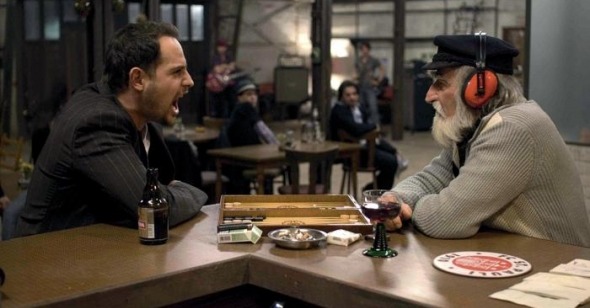Hamburg with Cheese
by Michael Koresky
Soul Kitchen
Dir. Fatih Akin, Turkey/Germany, IFC Films
German-Turkish director Fatih Akin’s penchant for over-peppering his plots with contrivance and forced convolution would seem to have found the perfect fit in the high-decibel comic confection Soul Kitchen. Appropriately broad (as opposed to his prior film, The Edge of Heaven, which could have been sketched with more subtlety to make its its we-are-connected narrative glibness at all persuasive), Akin’s new one, concerning a young man’s desperate attempts to keep his roadside restaurant open and thriving amidst many setbacks, is overstuffed, more than a little too pleased with itself, and only occasionally winning. As far as European comedies go, it’s fairly by the numbers, assembling a motley crew of emphatically crazy characters for a rollicking jamboree meant to stand in for the New Europe. For the most part, the tonic goes down easy this time, even as the plot grows increasingly merciless in its compulsion to keep the audience entertained.
The affably meaty Adam Bousdoukos—who in profile resembles Eric Bana gone to a bit to seed—stars as Zinos, a young Greek bruiser-type whose girlfriend, Nadine, is leaving for Shanghai at the very moment that tax collectors and poor business threaten to close down Soul Kitchen, his ramshackle dive out by some abandoned railroad tracks near the Elbe River in Hamburg. Catering to a natty, indifferent working-class clientele with fried fish sticks and goopy mayo salads, Zinos finds that he has to up his game and attract more customers, both to pay his debts and also to make enough money to be able to join Nadine halfway across the world.
Akin throws at Zinos a whole host of clichéd characters who both help and impede him in his efforts: there’s the appreciably sassy waitress, Anna, whose Uma Thurman-esque cat eyes suffer no fools; a tempestuous new gourmet chef, Shayne, who needs work but whose culinary pride won’t allow him to serve Zinos’s greasy mainstays; a grizzled barfly named Socrates; a skuzzy friend from elementary school, Thomas, now gone corporate, who shows up again in Zinos’s life, unsurprisingly with an angle; and, to save the most preposterous for last, Zinos’s cat-burglar brother, Illias (Run Lola Run‘s lumpen Moritz Bleibtreu), on partial parole from prison and needing work.
Despite the nonstop succession of cartoonish types he employs, Akin shows a palpable, genuine affection for the setting and people in Soul Kitchen, perhaps because he grew up in Hamburg. Akin does have an unfortunate predilection for silly visual gags and camera tricks (an in-and-out zooming during a concert scene is pure high-school grade juvenilia, and there are a few too many canted frames used to emphasize a world gone slapstick), not to mention a reliance on tired jokes—about online sex and getting erections at the chiropractor’s office; plus a truly dreadful late-film comic set piece set at a funeral that barely elicited as much as a titter from the packed screening room in which I saw the film. Nevertheless the filmmaker always manages to seek out a glimmer of charm buried somewhere beneath his sitcomish scenarios. Soul Kitchen comes across as a breezy breather for the auteur following his previous, more self-serious international art-house sensations. At least this time Akin doesn’t need to claim that his characters are anything more than movie types; such generic honesty might have made The Edge of Heaven more palatable.
